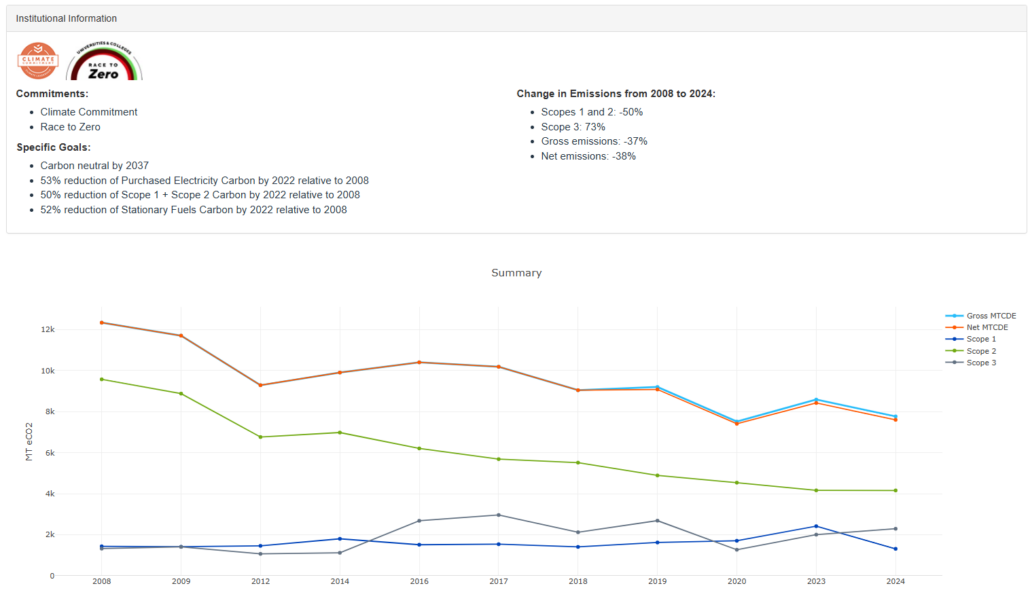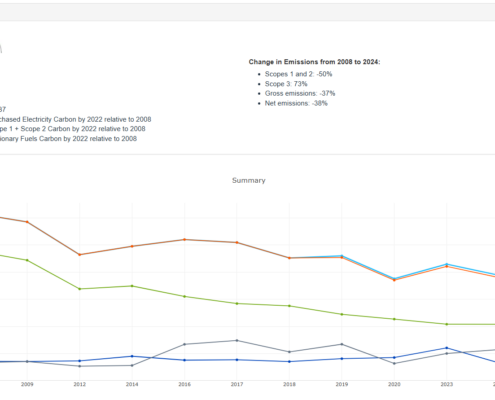Ecosystem Contributor
This month, Susan Kidd, Executive Director of the Center for Sustainability at Agnes Scott College, highlights the College’s Green Revolving Fund (GRF). GRF was launched in 2011 as a practical solution to this common challenge shared by colleges and universities that have committed to a goal of climate neutrality.
How can a campus achieve aggressive reductions in energy use, and reduce its carbon footprint, through efficiency upgrades?
Agnes Scott College initiated the college’s Green Revolving Fund (GRF) in 2011 as a practical solution to this common challenge shared by colleges and universities that have committed to a goal of climate neutrality. By 2015, Agnes Scott’s GRF had become a model for meeting this sustainability challenge, especially for schools with 5,000 or fewer students, by revolving more than $1 million to support energy capture and efficiency as well as water fixture retrofits campus-wide.
Now, five years after that first major goal was met, the Agnes Scott GRF has invested in efficiency retrofits totaling close to $2 million, including direct support for several large-scale, innovative projects. Most notably, 10% of the college’s 1 million square feet of building space gained geothermal heat and air conditioning with support from the GRF. In addition, this fund has proven not only to be an incredibly effective tool to finance efficiency projects, it has also been a key element in advancing two other campus sustainability objectives: engaging our students in research to solve “real world” sustainability challenges, and creating a campus culture that supports the goal of advancing climate neutrality initiatives.
Why was GRF a priority for Agnes Scott College? How does it relate to Agnes Scott’s core work?
The basic concept of a green revolving fund is to establish a pool of financial resources dedicated to investing in energy and water efficiency upgrades that will generate utility cost savings. The money saved through these projects is then recycled back into the fund for future projects, resulting in a sustainable funding source for climate neutrality efforts. At Agnes Scott, the GRF was designed to strengthen the college’s institutional capacity for building upgrades while ensuring that the campus will be more energy efficient. It was also designed to be managed by the campus community rather than by one department.
Agnes Scott is a liberal arts college for women founded in 1889 and located in Decatur. The enrollment for the 2019-2020 school year was just over 1,000 students. The college’s mission statement is to educate women “to think deeply, live honorably and engage the intellectual and social challenges of their times.” The approach that the college has taken to the GRF reflects this mission.
Sustainability and climate action are viewed by the leadership of the college as important components of Agnes Scott’s mission. In 2007 Agnes Scott was a charter signatory of Second Nature’s Carbon Commitment and in 2015 the college added a commitment to complete a Climate Resilience Plan with the surrounding community of Decatur. The college also participated as one of the first colleges to join the Billion Dollar Green Challenge, committing to invest $1 million toward its GRF within the first three years after startup.
What’s been the impact of GRF and other climate efforts at Agnes Scott College?
Soon after signing the climate commitment, the college completed its first greenhouse gas inventory and drafted a Climate Action Plan (CAP) with a goal of climate neutrality by 2037. At the same time the Board of Trustees passed a resolution that all major renovation and new construction projects on campus would be required to achieve at least LEED Silver status. Since then three renovation projects have been completed: The Anna Young Alumnae House (LEED Silver), Campbell Hall (LEED Gold), and Rebekah Scott Hall (LEED Platinum). The Campbell Hall and Rebekah Hall renovations benefited directly from GRF support and now operate on 100% geothermal HVAC.
The GRF has been a major driver in helping Agnes Scott College reduce its energy and water consumption and in the college’s efforts to achieve climate neutrality. Results include:
- As of the 2017-2018 school year the college has reduced its emissions overall by close to 30% and emissions per full-time student by 39%.
- Projects funded thus far funded by the GRF save the college an estimated total of $1 million in avoided water and energy expenses.
- Six individual student internships have brought students from different academic departments to the Center. These are often students that may not have had a sustainability focus previously.
- Moreover, the educational objective of the GRF has given many more students the opportunity to engage in environmental and sustainability issues and to wrestle with trying to create the right balance of environment, economics and equity as they make decisions. Students participating in the GRF Committee have made valuable contributions to proposal discussions, and have influenced the decision-making process with inventive solutions.
At Agnes Scott the innovation investment of the GRF is truly seen as a tool for college improvement. It builds trust. The improvements from GRF projects, while not always flashy, have made the Center for Sustainability better at showing that climate mitigation takes a community approach and involves projects ranging from lighting upgrades to solar panels.
###
Susan Kidd is the Executive Director of the Center for Sustainability at Agnes Scott College. In addition to the attention that the GRF has received, Agnes Scott’s overall sustainability profile has increased recently. The college received its STARS Gold rating in 2018 from the Association for the Advancement of Sustainability in Higher Education (AASHE) and then in 2019 received recognition for data accuracy in the Sustainable Campus Index that was released by AASHE. In 2020 Agnes Scott was ranked 13th in The Princeton Review Guide to Green Colleges. This marked the first time Agnes Scott has been ranked in the top tier, and is the only college with fewer than 5,000 in the top 15. Agnes Scott also earned a top performer award for energy conservation from the Atlanta Better Buildings Challenge in 2019.



